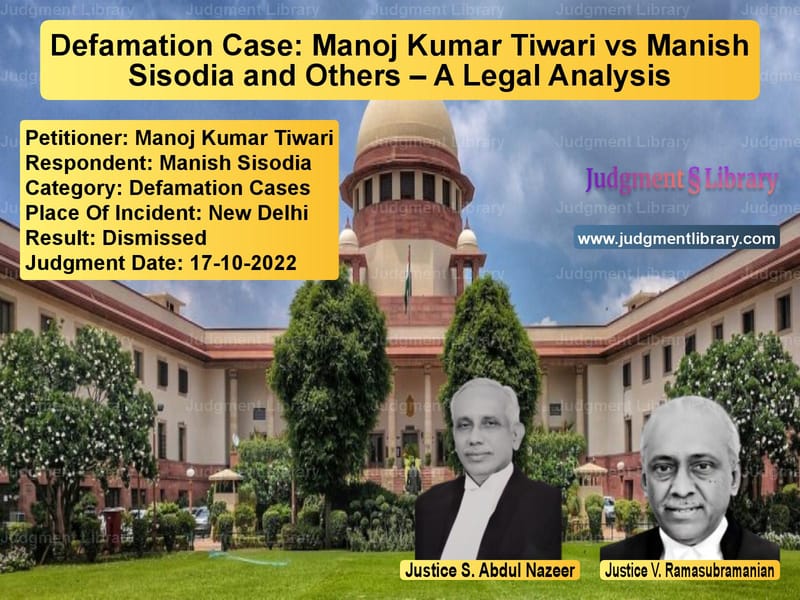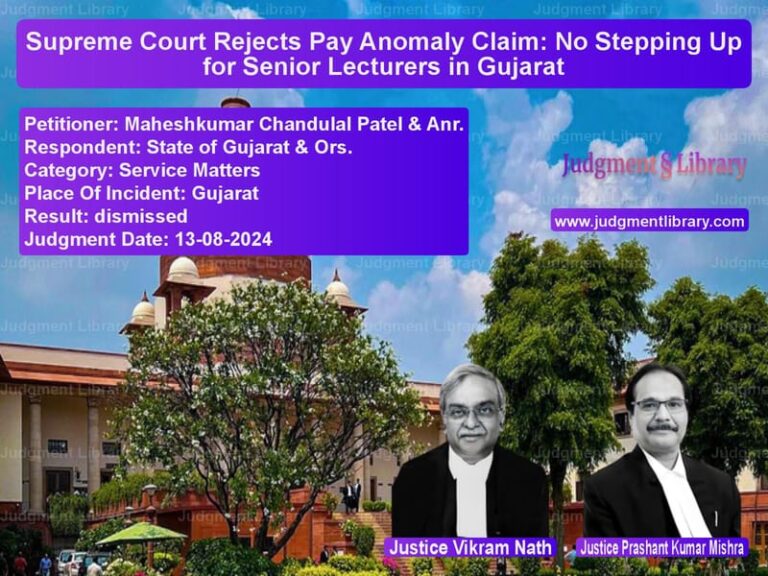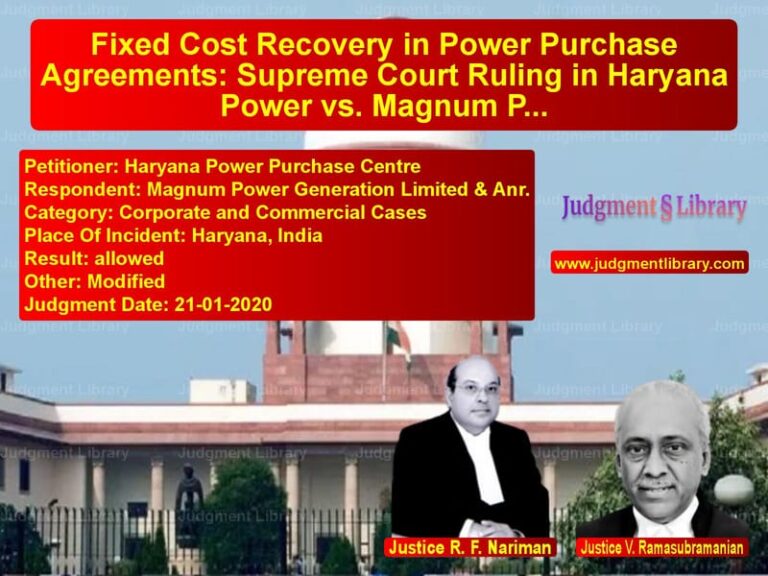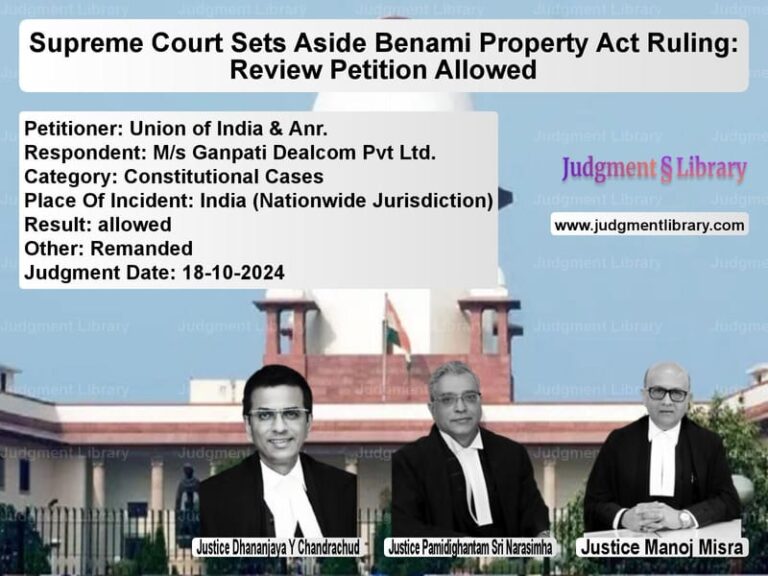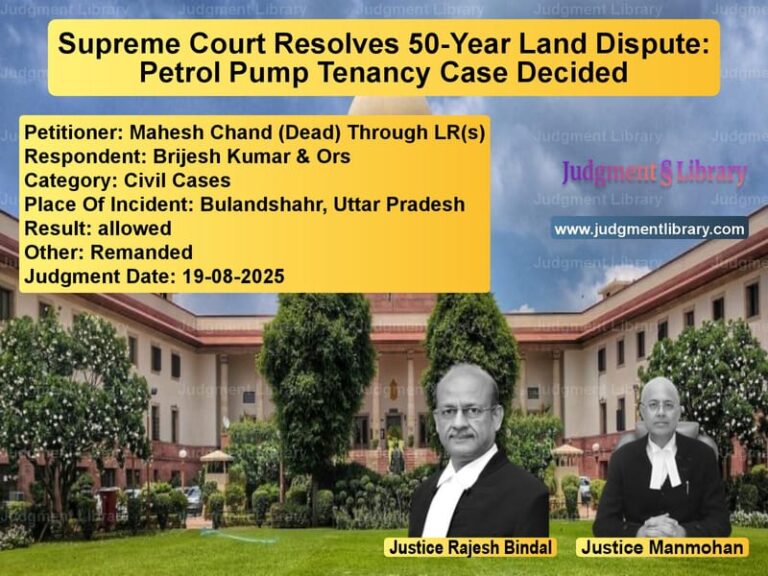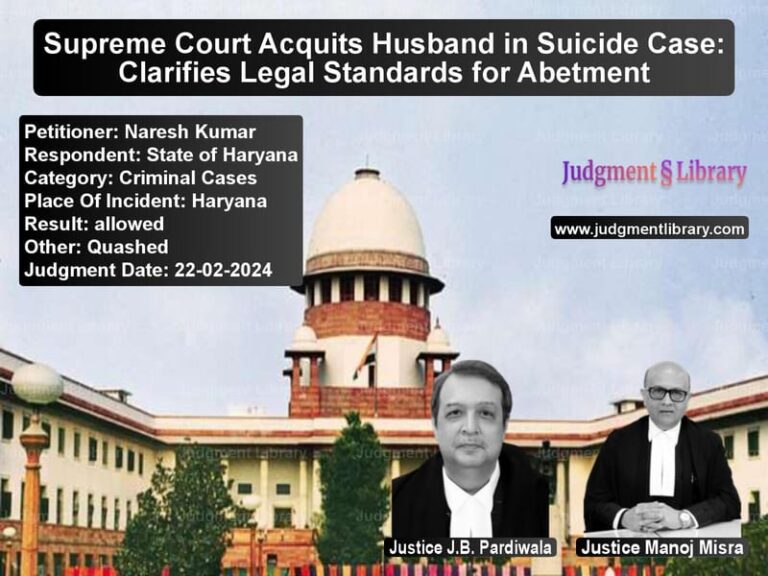Defamation Case: Manoj Kumar Tiwari vs Manish Sisodia and Others – A Legal Analysis
The case at hand revolves around the criminal appeal filed by Manoj Kumar Tiwari and others, challenging the summoning order passed by the Additional Chief Metropolitan Magistrate in a defamation case. This matter concerns the alleged defamatory statements made by the appellants, including Tiwari, who is accused of defaming Manish Sisodia, the Deputy Chief Minister of Delhi, in the context of a press conference and subsequent social media posts. The Supreme Court judgment provides valuable insights into the procedural aspects of defamation law under Indian Penal Code (IPC) and the Code of Criminal Procedure (CrPC).
The Defamation Complaint
On July 1, 2019, the complainant, Manish Sisodia, filed a defamation complaint under Section 200 of the Cr.P.C. against six individuals, including Manoj Kumar Tiwari (Accused No. 1) and Vijender Gupta (Accused No. 5), after the latter allegedly made defamatory statements about him during a press conference and subsequent social media posts. The statements pertained to allegations of corruption in the construction of classrooms for Delhi Government Schools, specifically the claim that Sisodia was involved in a Rs. 2000 crore scam. The complainant argued that the statements, made jointly by the accused persons, were aimed at tarnishing his reputation and, thus, amounted to defamation under Sections 499 and 500 of the IPC.
Procedural History and Legal Arguments
The Additional Chief Metropolitan Magistrate issued a summons against all six accused after considering the complaint, witness testimonies, and documentary evidence provided by Sisodia. This order was challenged by the appellants in the Delhi High Court, which dismissed their petitions. Consequently, the appellants filed criminal appeals before the Supreme Court, challenging the legality of the summons and the procedural requirements under the Cr.P.C.
The Appellants’ Arguments
Manoj Kumar Tiwari (Accused No. 1) challenged the summoning order on the ground that the High Court had wrongly allowed a private complaint under Section 200 of the Cr.P.C., despite the complainant being a public servant. According to Tiwari, Section 199(2) of the Cr.P.C. necessitated the application of a special procedure in defamation cases involving public servants, and the complainant should have followed the specific procedure outlined in Section 199(4) of the Cr.P.C.
Vijender Gupta (Accused No. 5) raised three objections: (i) that the special procedure under Section 199(2) was not followed, (ii) the transcript of the tweets attributed to him was not accompanied by a valid certificate as required by Section 65B of the Indian Evidence Act, and (iii) that the statements made in the tweets did not amount to defamation under Section 499 of the IPC.
Respondent’s Defense
Defending the summoning order, Manish Sisodia’s counsel, led by Dr. Abhishek Manu Singhvi, argued that the special procedure outlined in Section 199(2) does not preclude the use of the general procedure under Section 199(6) for individuals, including public servants, to file defamation complaints. They emphasized that Section 199(2) provides an alternative route, but it does not eliminate the individual right of a public servant to pursue a defamation claim independently. The defense also contended that the defamatory statements made in the press conference and tweets were clearly intended to damage the reputation of Sisodia and were thus defamatory under the provisions of the IPC.
Legislative History of Section 199
The Court, in its judgment, explored the legislative history of Section 199 of the Cr.P.C., particularly in the context of public servants and defamation. The Court reviewed the changes made to the Cr.P.C. over the years, noting that Section 199 provides two alternative procedures: one for public servants, including ministers, and another for individuals who are not public servants. The special procedure outlined in Section 199(2) applies to cases involving public servants, but it does not prevent them from pursuing a case under the general procedure outlined in Section 199(6).
Read also: https://judgmentlibrary.com/arnab-goswami-case-freedom-of-speech-vs-criminal-proceedings/
The Court’s Analysis and Judgment
The Supreme Court analyzed the grounds raised by the appellants, focusing particularly on the issue of whether a public servant’s defamation complaint should follow the special procedure under Section 199(2) or if they could pursue a general procedure under Section 199(6). The Court held that the right of a public servant to file a defamation case under Section 199(6) was not negated by the special provisions in Section 199(2). The Court clarified that Section 199(2) provides a special procedure but does not eliminate the general right to file a complaint under Section 199(6), allowing public servants to initiate defamation cases either way.
On the matter of the tweets made by Vijender Gupta, the Court found that the tweets did not amount to defamatory statements. The Court ruled that the statement made by Gupta, claiming that Sisodia’s answers to his questions would expose a scam, was not defamatory in nature. The Court noted that general accusations, like the claim that someone would be exposed for corruption, cannot be considered defamatory unless there is a specific imputation of wrongdoing with the intent to harm the person’s reputation.
Conclusion
The Supreme Court dismissed the appeal of Manoj Kumar Tiwari, upholding the summoning order against him. However, the Court allowed the appeal of Vijender Gupta, setting aside the summoning order in his case. The Court found that the tweets attributed to Gupta did not constitute defamation under the IPC, as the statements were general in nature and did not specifically damage the reputation of the complainant.
Key Takeaways
- The Supreme Court reaffirmed that public servants can initiate defamation cases under the general procedure of Section 199(6) even if the defamation concerns their conduct in public office.
- The Court clarified that general allegations or statements about corruption, without specific defamatory content, do not meet the threshold for defamation under Section 499 of the IPC.
- The ruling emphasized the importance of distinguishing between general accusations and specific defamatory imputation in defamation cases.
Petitioner Name: Manoj Kumar Tiwari.Respondent Name: Manish Sisodia.Judgment By: Justice S. Abdul Nazeer, Justice V. Ramasubramanian.Place Of Incident: New Delhi.Judgment Date: 17-10-2022.
Don’t miss out on the full details! Download the complete judgment in PDF format below and gain valuable insights instantly!
Download Judgment: manoj-kumar-tiwari-vs-manish-sisodia-supreme-court-of-india-judgment-dated-17-10-2022.pdf
Directly Download Judgment: Directly download this Judgment
See all petitions in Civil Defamation
See all petitions in Judgment by S. Abdul Nazeer
See all petitions in Judgment by V. Ramasubramanian
See all petitions in dismissed
See all petitions in supreme court of India judgments October 2022
See all petitions in 2022 judgments
See all posts in Defamation Cases Category
See all allowed petitions in Defamation Cases Category
See all Dismissed petitions in Defamation Cases Category
See all partially allowed petitions in Defamation Cases Category

